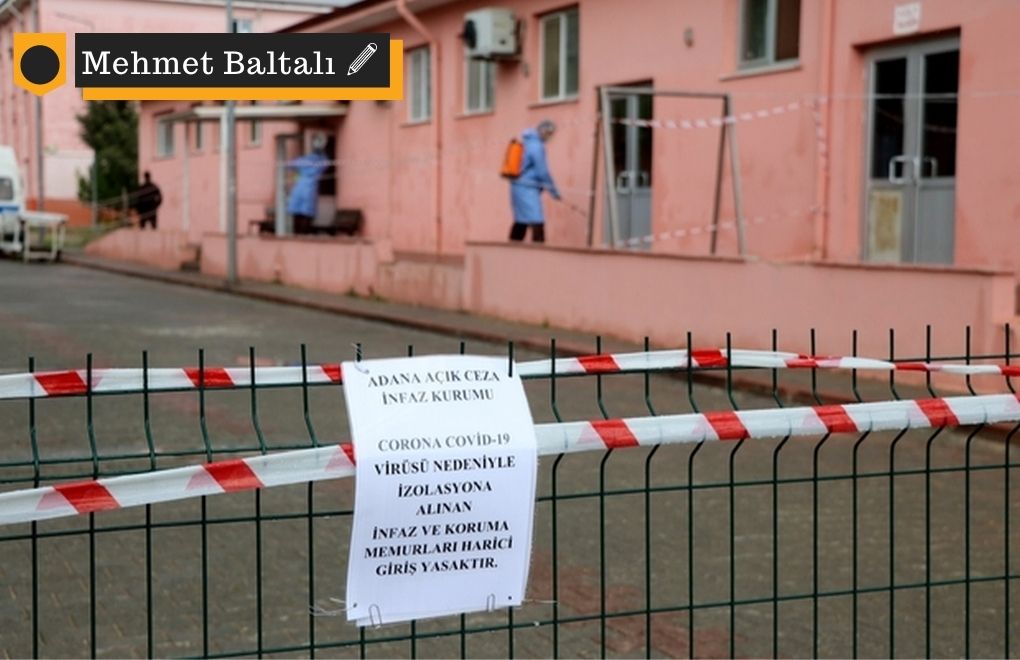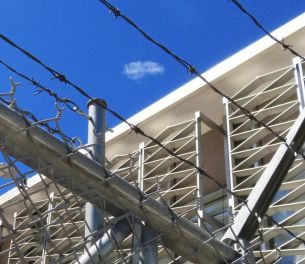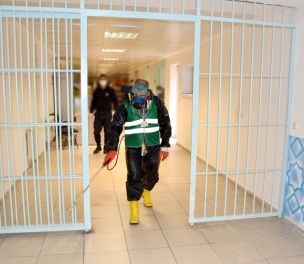A warning sign at Adana Open Prison's entrance reads that only correction officers can enter.
Click to read the article in Turkish
Marion Correctional Institution is a prison in Ohio. Among 2,521 convicts it has, 2,510 were tested for Covid-19. The result is surprising: Covid was found in 2,179 convicts (1). In the mass Covid-19 tests in 17 prisons, the American Center for Disease Control and Prevention found that nearly half of the convicts were Covid-19 carriers (2). The disease rate is much higher especially in prisons with wards. Prisons are in danger all around the world (3).
Conditions in prisons
Prisons are full, convicts are living cheek by jowl (4). It is impossible to follow the social distancing rule. Hygiene rules are not followed as required. It is not clear how much soap is used or whether disinfectants are available. It is difficult to implement quarantine. All these reasons explain why epidemic diseases such as typhoid and tuberculosis in the past and Covid-19 now are seen in prisons at a high rate.
Another problem is psychological. Prisoners don't want to live in isolation or be stigmatized. For this reason, even if they have complaints, they conceal them. Among patients with a positive PCR test, 96 percent stated that they didn't have any complaints. This significantly increases the spread of the disease in prisons. This psychology, combined with the difficulty in prisoners' access to a doctor, risks not only others but also their own lives. Prisoners are hospitalized with a much more severe clinical picture than others. Their rates of intensive care admission and fatality are also much higher compared to patients who are not convicts (5).
With regard to the severity of this situation, the World Health Organization listed a series of precautions that should be followed (6). These are precautionary measures to prevent the spread of the virus, including measures about prison visits, the entrance of new convicts, screening staff and release of convicts.
No data in Turkey
All of what I have written until now are from abroad. The situation in Turkey, on the other hand, is unknown. Deutsche Welle pointed out in a news report that the pandemic process is not managed transparently (7). There are a lot of claims on social media about cases in prisons. There has not been a satisfactory statement about all these from the authorities until now.
In Turkey, some of the convicts were released for justifiable reasons such as reducing the occupancy rate in prisons and especially protecting the elderly and those with chronic diseases (8). It is claimed that one of the reasons for the worldwide increase in tuberculosis cases was the amnesties in Russia in 1997 and 2000 (9). WHO also recommends Covid-19 tests on convicts before their release to prevent the spread of the disease in the community (5). I have not encountered any information about whether this kind of simple measures are taken in Turkey.
Covid-19 cases in prisons, as WHO states, is a public health problem that doesn't only concern convicts but the whole society. I think it is very important to prevent the spread of the pandemic that all officials act in a transparent and right way. (NÖ/MB/VK)
1. https://www.reuters.com/article/us-health-coronavirus-prisons-testing-in-idUSKCN2270RX
2. Hagan LM, Williams SP, Spaulding AC, et al. Mass Testing for SARS-CoV-2 in 16 Prisons and Jails — Six Jurisdictions, United States, April–May 2020. MMWR Morb Mortal Wkly Rep 2020;69:1139–1143. DOI: http://dx.doi.org/10.15585/mmwr.mm6933a3external icon
3. https://www.reuters.com/news/picture/coronavirus-spreads-through-prisons-arou-idUSRTS38GXF
4. Dumont DM, Brockmann B, Dickman S, Alexander N, Rich JD. Public health and the epidemic of incarceration. Annu Rev Public Health 2012; 33:325
5. https://doi.org/10.1101/2020.08.08.20170787
8. https://www.aa.com.tr/tr/pg/foto-galeri/cezaevlerinde-tahliyeler-suruyor-
9. Mercer AJ, Jacobs B, Moon S, Kynch J. Prisons and the tuberculosis epidemic in Russia. J Int Dev2003;15:559-74doi:10.1002/jid.1003 .











-132.jpg)

